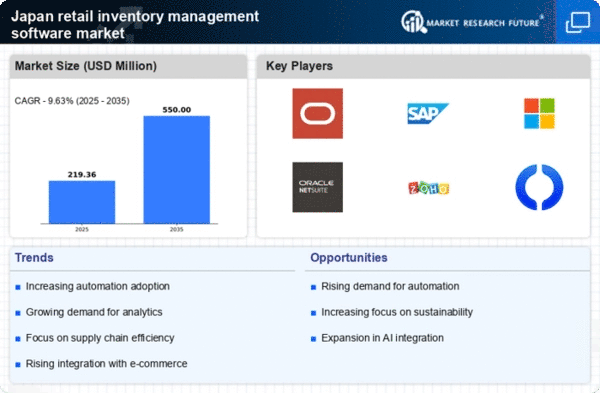Expansion of Omnichannel Retailing
The retail inventory-management-software market is being propelled by the expansion of omnichannel retailing strategies among Japanese retailers. As consumers increasingly engage with brands across multiple platforms, the need for integrated inventory management systems becomes paramount. Retailers are seeking solutions that can seamlessly synchronize inventory across physical stores, e-commerce platforms, and mobile applications. Recent statistics indicate that omnichannel customers tend to spend 30% more than single-channel customers, highlighting the financial incentive for retailers to invest in robust inventory management solutions. Consequently, the retail inventory-management-software market is likely to benefit from this trend, as businesses strive to create a cohesive shopping experience that meets the evolving preferences of consumers.
Increasing Focus on Cost Efficiency
Cost efficiency is becoming a critical driver for the retail inventory-management-software market in Japan. Retailers are under constant pressure to reduce operational costs while maintaining high service levels. Effective inventory management software can help businesses minimize excess stock, reduce holding costs, and streamline supply chain operations. Recent surveys suggest that companies utilizing advanced inventory management solutions can achieve cost savings of up to 20%. This financial incentive is prompting more retailers to invest in software that enhances their inventory control processes. As the competitive landscape intensifies, the retail inventory-management-software market is likely to see a rise in demand for solutions that deliver measurable cost benefits.
Regulatory Compliance and Standards
The retail inventory-management-software market is also influenced by the need for regulatory compliance and adherence to industry standards in Japan. Retailers are increasingly required to comply with various regulations concerning inventory management, including safety standards and reporting requirements. Software solutions that facilitate compliance can help businesses avoid penalties and enhance their operational credibility. Furthermore, as consumer awareness regarding product safety and traceability grows, retailers are compelled to adopt systems that ensure transparency in their inventory practices. This trend is likely to drive the demand for sophisticated inventory management software that not only meets regulatory requirements but also supports ethical business practices.
Rising Demand for Real-Time Inventory Tracking
The retail inventory-management-software market in Japan is experiencing a notable surge in demand for real-time inventory tracking solutions. Retailers are increasingly recognizing the importance of maintaining accurate stock levels to enhance customer satisfaction and operational efficiency. According to recent data, approximately 70% of retailers in Japan have reported that real-time tracking capabilities significantly reduce stock discrepancies. This trend is driven by the need for businesses to respond swiftly to consumer demands and market fluctuations. As a result, software solutions that offer real-time visibility into inventory levels are becoming essential. the retail inventory-management-software market is likely to see continued growth as more retailers adopt these technologies to streamline their operations and improve overall performance.
Technological Advancements in Software Solutions
Technological advancements are significantly influencing the retail inventory-management-software market in Japan. Innovations such as cloud computing, machine learning, and data analytics are enhancing the capabilities of inventory management systems. These technologies enable retailers to analyze sales trends, forecast demand, and optimize stock levels more effectively. For instance, cloud-based solutions allow for greater flexibility and scalability, which is particularly appealing to small and medium-sized enterprises. As a result, the adoption of advanced software solutions is expected to rise, with a projected growth rate of 15% annually in the coming years. This trend indicates a shift towards more sophisticated inventory management practices within the retail sector.
















